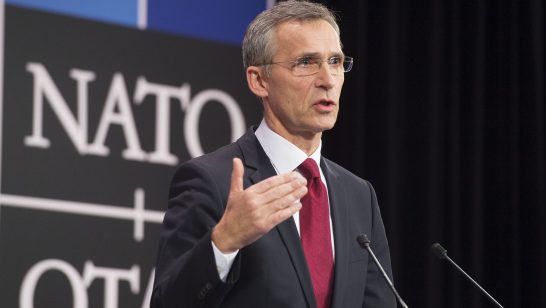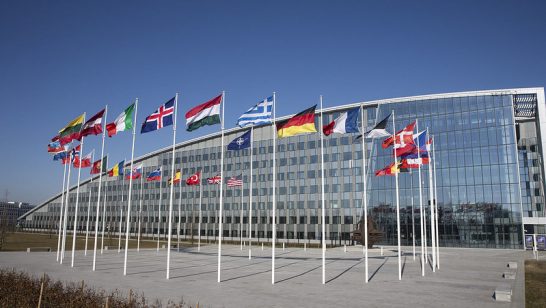
The current Euro-Atlantic security environment, defined by strategic competition, indicates that there is a compelling need to strike a “New Transatlantic Compact” (NTC) between NATO and the EU. This has become more evident at a time when President Biden has announced ‘America is back’, multilateralism is regaining ground, and transatlanticism is increasingly seen as an asset to deal with systemic challenges in a multipolar world. Moreover, NATO will soon start updating its Strategic Concept, the EU has initiated a process towards a Strategic Compass, and the consequences of Brexit will become clearer.
The UK’s departure from the EU gives a fresh impetus to the discussions about the role of the non-EU NATO members – including our own country, Turkey – in European defence and security.
The involvement of non-EU Allies in EU initiatives has been a major, albeit a controversial, component of the strategic partnership between NATO and the EU. Starting with the adoption of the Nice Implementation Document by the EU in 2002, there has accumulated a body of understanding of the role of non-EU NATO members in contributing to European security and defence. This is recognised in the NATO 2030 Experts’ Report, which states: “The fullest involvement of the NATO Allies that are not members of the EU in its initiatives is essential for strategic partnership between the two organisations”.
The way in which this understanding been implemented by the EU is still dubious, to say the least. It could be argued that in the last few years there has been quite good progress achieved in the strategic partnership between NATO and the EU, particularly in the wake of the NATO Warsaw Summit of 2016. The leaders of both organisations specified 74 proposals to improve cooperation and coordination between the two organisations. The extent to which those proposals have yielded groundbreaking results is still a source of ongoing debate, primarily owing to the political obstacles raised by the EU in practice. It is impossible to deny the existence of challenges relating to the Cyprus question (which should be resolved by both peoples living in Cyprus, with the support of Turkey, Greece and the UK as the guarantor powers). However, the progress achieved in practical terms in the last five years since the Warsaw Summit should not be underestimated.
The Brexit effect
The Brexit process was painstaking and arduous for both the UK and EU. It did, however, finally have a soft landing, leaving aside some residual issues of concern to be surmounted over time. Finally the UK published its ‘Integrated Review 2021’ (IR 2021) on 16 March 2021, setting out its objectives in the post-Brexit era till at least 2030.It emphasisesthat the UK will follow a path of more ‘freedom to do things differently, economically and politically, where that suits our interests.’
Emancipated from what Prime Minister Boris Johnson has called the ‘shackles of the EU’, the UK government is seeking to expand its room for manoeuvre in the security and defence realm without destabilising its alliances and partnerships. The IR emphasised that the Euro-Atlantic region remains the central region of interest for the UK’s security, and underscored its commitment to NATO. The fact that the UK, one of the major powers and defence spenders, is now one of the non-EU members of the Alliance only underlines the need to ensure a smooth working relationship between the EU and non-EU Allies.
The search for “strategic autonomy”
Meanwhile, the transatlantic relationship needs to contend with how the EU intends to define the notion of “strategic autonomy”. This notion started to gain ground in the early 2000s, yet its practical meaning is still a matter of debate. Its origins lie in security and defence, but it has permeated to the other pillars of the EU. This controversial notion reflects a divide between those who advocate the need for the EU to stand on its own feet and enlarge its space of freedom vis-à-vis the United States, and those who think Europe should focus its efforts on strengthening and re-energising its relations with the US.
While European Council President Charles Michel said “European strategic autonomy is goal number one for our generation” in September 2020, EU High Representative Josep Borrell introduced a vague definition of strategic autonomy in December 2020 as “lack of dependency” in a multitude of domains, including security and defence. At later stages, Borrell has attempted to widen the scope of its definition in cautious terms, and pointed to the ongoing work on the EU’s Strategic Compass, due to be published in spring 2022, as an avenue for fleshing the concept out further.
Following Macron’s controversial 2019 comment that NATO was “brain dead”, Allied leaders invited the Secretary General to launch a forward-looking reflection process to map out a strategic outlook for NATO for the next decade and beyond, which culminated in the NATO 2030 experts’ report mentioned above (in which one of the authors participated). The Experts Report highlights, contrary to the longstanding French position, a need for Allies to commit themselves to the use of NATO as the primary forum to debate their national-security issues, even when NATO may not be the first responder. The report also argues that EU efforts to develop strategic autonomy “should be developed in a spirit of NATO cohesion and with the aim of achieving a common vision” based on cooperation.
With these considerations in mind, it is in the interest of North American and European members of NATO to agree on a remit at the upcoming NATO Summit to launch a process designed to develop a new transatlantic compact.
We propose the ensuing elements to be considered:
– The aspiration should be to have seamless cooperation between the two organisations. The two different membership clusters, as well as the structural differences in the two organisations, lend themselves to intricate political and legal complexities. That does not, however, change the reality that “non-EU NATO members account for 80% of defence spending, [and] three of the four NATO battlegroups deployed in Poland and the Baltic states” in the words of Stoltenberg.
– Despite this situation, the increasing calls for strategic autonomy in security and defence hark back to decoupling North America from Europe, thereby leading to suspicions not only among the non-EU NATO members, but even within the EU. Therefore, there should be a clear understanding on both sides that NATO will remain as the cornerstone of European security based on the three core tasks agreed by all Alliance members: collective defence, crisis management and cooperative security.
– Given scarce resources for defence and the essential need for complementarity, not in words but also in deeds, duplicating military requirements and capabilities should be avoided.
– Under the present security circumstances it could be argued that NATO-EU relations cannot solely be confined to the Berlin Plus arrangements of the early 2000s. To go further, the ideas of Reverse Berlin Plus or Berlin Plus 2.0 have been floated, but with no tangible results. This has been primarily due to the restrictive attitude of some EU members towards giving NATO assured access to the EU’s capabilities when needed.
– The aim of involving non-EU NATO members “as fully as possible” in EU initiatives, set out in the 2018 joint declaration, has not yet been delivered in full and needs further attention.
– While the EU seems of late more interested in NATO-EU cooperation than it has been in the past particularly after President Biden came to power in the US, there seems to be less enthusiasm from the EU than from NATO. Maintaining solidarity and resilience cannot simply be the hallmark of NATO. These should be equally upheld by the EU when it comes to cooperating with the non-EU members of NATO in terms of European security and defence. Ultimately, the fundamental rule of the indivisibility of security should apply across the board without discrimination.
The opinions articulated above represent the views of the author(s) and do not necessarily reflect the position of the European Leadership Network or any of its members. The ELN’s aim is to encourage debates that will help develop Europe’s capacity to address the pressing foreign, defence, and security policy challenges of our time.
Image: Flickr, NATO North Atlantic Treaty Organization




